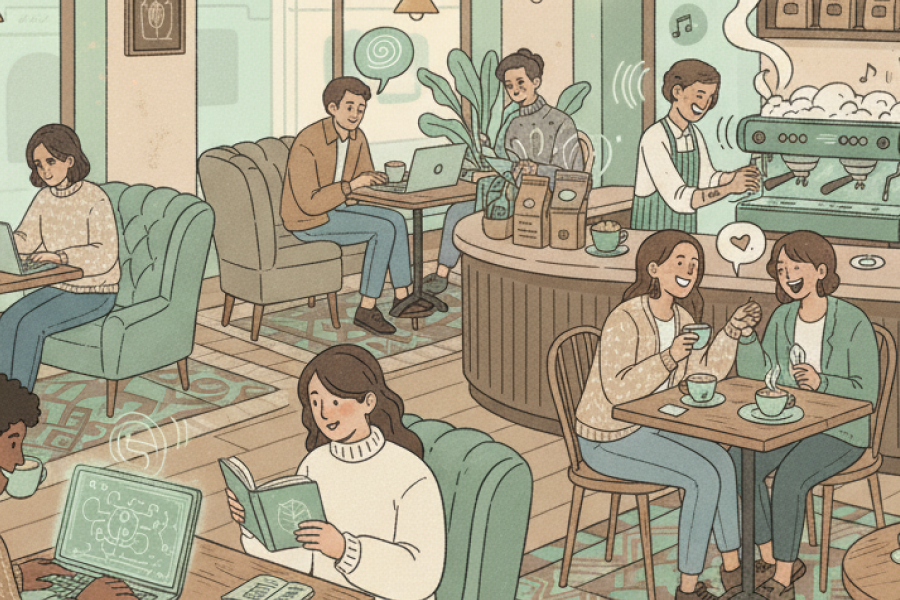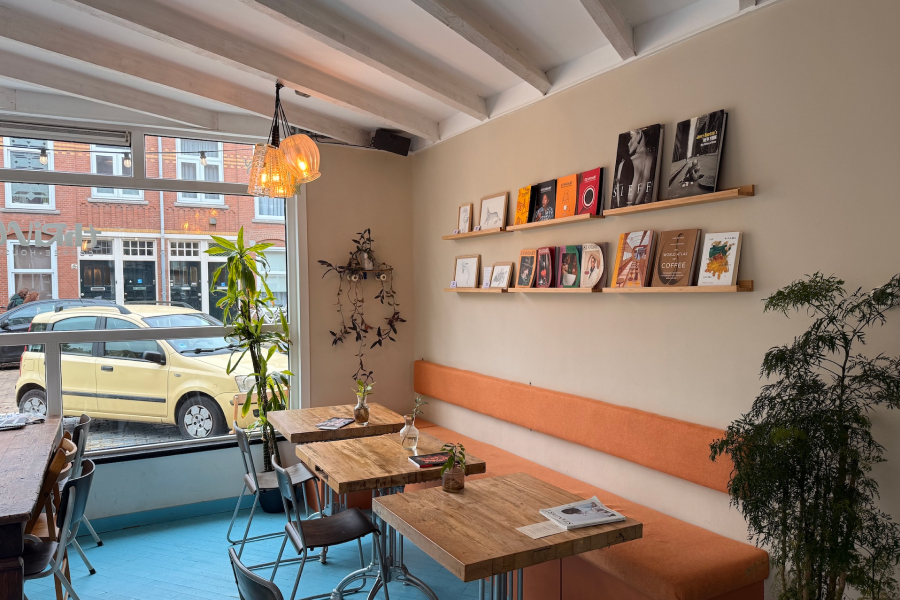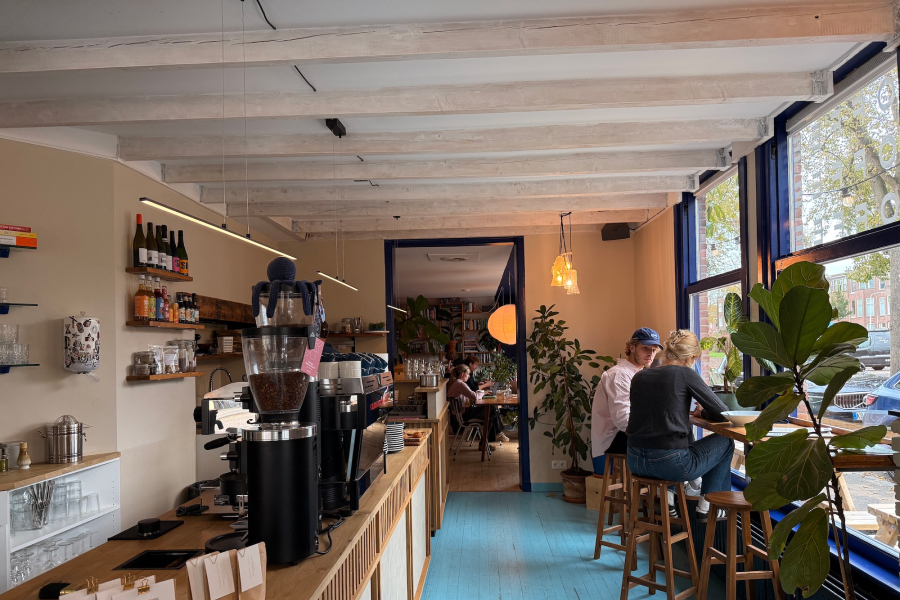Why people are working more from cafés, and why that’s not a bad thing
Remote and hybrid work are reshaping cafe culture—here’s how laptop guests can create a win-win for guests and owners alike.

Walk into any café these days and you’ll probably spot at least one person with a laptop open, headphones on, typing away. For some café owners, that sight sparks mixed feelings. It’s nice to have people enjoying your space, but what about the person who camps out for three hours on a single americano?
It’s a fair concern. But the truth is, this new wave of people working from cafés isn’t a bad thing. In fact, it can be a really good thing for both the people looking for a cozy spot to get things done and the cafés that welcome them.
Let’s unpack why.
The world of work has changed#

A warm, illustrative depiction of a café filled with activity and ambient sounds.
Not everyone is tied to an office anymore. Remote and hybrid work have become the new normal, and that’s changing how people organize their days.
As a Forbes Business Council article notes, coffee shops are becoming mini coworking spaces by default, the “third place” between home and the office.
People aren’t just going out for caffeine. They’re looking for a bit of energy, background noise, and maybe a reminder that the world is still spinning outside their apartment walls. Cafés give them all that, without the stiffness of a desk job or the silence of working alone at home.
Why cafés are perfect for focus and creativity#
There’s actual research behind why cafés feel good to work in. A study mentioned by Limepack found that the hum of conversation, the clatter of cups, and the faint sound of milk frothing can boost creativity. It’s called the “coffee shop effect.” The right kind of background noise can help people think more freely.
Well Collective adds that cafés have this magic combination of comfort and sensory stimulation. The smell of coffee, soft lighting, and music make people feel motivated without pressure.
In short, cafés naturally create an environment that makes people want to focus, read, or create. It’s not about turning cafés into offices, it’s about embracing what already makes them great places to be.
Why that’s not a bad thing for cafés#

Image shows a minimalist cafe counter with guests seated near a sunny window.
Let’s be honest. One person behind a laptop for three hours on a single americano isn’t keeping the lights on. We get it. But that’s not really the issue.
The opportunity lies in finding balance, and a great example of that is Thrive Coffee in The Hague, one of our favourite spots at koffie.work.
Thrive isn’t the kind of place filled wall to wall with laptops. It’s small, cozy, and warm. There are just two tables where you can work on your laptop, enough for about eight to twelve people. The rest of the café invites you to take a break. There’s a couch and a wall filled with books, creating an atmosphere that encourages you to stay, not just to work.

Image shows cozy cafe seating with blue floors, a book-lined shelf, and bright window light.
What’s interesting is that Thrive doesn’t shout its laptop policy from the rooftops. There’s only a small note on the work tables, and the rest is left to conversation. The owner might casually tell you which tables are meant for laptops, or gently ask you to move if you sit in the wrong spot. It’s friendly and personal, not strict or corporate.
But here’s the thing: many people never even step inside cafés like this because they assume laptops aren’t allowed at all. And that’s part of why we built koffiework. We’ve all had those moments of standing outside a café, wondering if it’s okay to open your laptop or if you’ll get “the look” from staff. koffiework helps take away that uncertainty by showing you which cafés welcome laptops, and which are better for reading, relaxing, or chatting instead.
So you know before you go whether you can get some work done, or whether you’re better off enjoying a screen-free break.
The win-win: cafés and customers both benefit#
When cafés welcome remote workers thoughtfully, good things happen on both sides.
- Steadier traffic during quiet hours. Remote workers often come during mid-mornings or early afternoons, when cafés are usually slow.
- Regulars and community. People who work from a café regularly become loyal customers. They’ll come back multiple times a week and often bring friends or colleagues later.
- More visibility. As Restaurant Web Expert notes, cafés that are welcoming to students and remote workers often get talked about online, creating free word-of-mouth marketing.
- Better atmosphere. There’s something special about a café that buzzes with quiet productivity. It feels alive.
Finding what works for you#
Every café finds its own rhythm when it comes to welcoming people who work or study. What works in Amsterdam might not work in Athens or Ankara. In some places, people happily spend an afternoon on their laptop while ordering food and drinks. In others, cafés prefer a shorter, more social experience.
There’s no single formula. Some cafés use small notes on certain tables, others rely on friendly chats with customers, and some simply let the atmosphere speak for itself. What matters most is that the approach feels right for your space, your culture, and your customers.
That’s what makes the café culture so unique and why koffiework exists: to make it easier for people to find the kind of place that fits them.
Final sip#
People aren’t just drinking coffee anymore. They’re finding focus, inspiration, and community in cafés.
For café owners, this is a chance to embrace a growing culture that fills seats, builds loyalty, and creates the kind of buzz money can’t buy. And for those working or studying, it’s a reminder that good ideas often start with a cup of coffee and a welcoming space.
At koffie.work, we celebrate cafés like these, places that understand that working from a café isn’t a problem. It’s just a modern way to thrive. ☕
Keep exploring

Why the quietest place isn’t always the best place to work: the art of background noise in cafés
A deeper look at the “coffee shop effect” and why a gentle buzz of sound can unlock focus and creativity.

Working from a cafe is not coworking: the mindful setup that actually works
A practical, opinionated guide to working from cafés without taking over the place, plus the small setup that genuinely helps.

Best specialty coffee spots in The Hague (for remote workers)
7 koffiework community picks in The Hague for specialty coffee and remote-work-friendly vibes, from beach brunch spots to hidden roastery oases.
Sign up for our newsletter
Curious what we're brewing? Leave your email to stay in the loop.